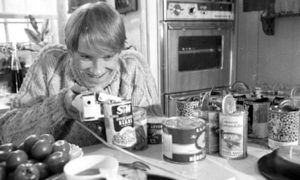STUDIO: Kino Lorber | DIRECTOR: Karel Reisz | CAST: David Warner, Vanessa Redgrave, Robert Stephens, Irene Handl, Bernard Bresslaw, Arthur Mullard
RELEASE DATE: Available now | PRICE: DVD $13.99, Blu-ray $19.99
BONUSES: Audio commentary by entertainment journalist Bryan Reesman
SPECS: NR | 97 mins | Comedy/Drama | 1.66:1 | DTS
Morgan: A Suitable Case for Treatment is very much a product of its era (1966). A screwball comedy tinged with true emotion, the film exists as an unusual hybrid of the British “angry young man” pictures and the New Wave-influenced “inventory of effects” comedies by Richard Lester.
The plot is a classic screwball scenario following the colorful, crazy working-class artist Morgan (David Warner, Cross of Iron) as he tries to win back his socialite wife Leonie (Vanessa Redgrave, Julia), who is planning on marrying a snobby art gallery owner (Robert Stephens, The Private Life of Sherlock Holmes). Morgan comes up with two master plans: first, kidnapping her, and then (when that fails to change her mind) to ruin her wedding reception.
The film is an obvious descendent of “charming nut” films like Harvey, but it also was one of the first in the spree of Sixties/early Seventies movies where the crazy characters are the normal ones, and society is really mad. (King of Hearts by Philippe de Broca was one among many of these cine-tales.)
Director Karel Reisz (the Czech-born director who only worked in film in the U.K. and U.S.) had already made one of the seminal “kitchen sink” films of the early Sixties, Saturday Night and Sunday Morning (1960), and he infused Morgan with the spirit of the era by using the many comic techniques introduced by the French New Wave and popularized by Richard Lester in his Beatles films and The Knack and How to Get It.
 Thus, the film contains freeze frames in the middle of a scene (echoes of Marker’s “La Jetee”); sped-up motion evoking silent comedy; stark, documentary-like camerawork; and archival footage to depict Morgan’s thoughts and fantasies. The element added by Reisz that makes the film such a curiously effective piece is an undercurrent of emotion that produces sympathy for the clearly heartbroken Morgan — as garishly irritating as he might be in some scenes, he’s quite the sad sack in others.
Thus, the film contains freeze frames in the middle of a scene (echoes of Marker’s “La Jetee”); sped-up motion evoking silent comedy; stark, documentary-like camerawork; and archival footage to depict Morgan’s thoughts and fantasies. The element added by Reisz that makes the film such a curiously effective piece is an undercurrent of emotion that produces sympathy for the clearly heartbroken Morgan — as garishly irritating as he might be in some scenes, he’s quite the sad sack in others.
Warner, who has given a number of impressive performances since Morgan (and is still working today, at age 79), does a wonderful job of conveying both the abrasive and charming, whimsical sides of his character. His twin obsessions of monkeys (he believes he is one) and doctrinaire Marxism (his parents raised him to be one) are a peculiar match, but they give the film a perfect air of brainy whimsy.
Redgrave is fascinating as Leonie. Still clearly in love and sexually compatible with Morgan, she has chosen her new elitist beau because he represents a return to her class and some sense of dull normalcy. While her character is playful and sexually liberated, she is not the “dollybird” seen in Sixties British comedies. She may be shallow about class, but she is independent and defiant, even during the the part of the film where Morgan and an aged wrestler friend kidnap her.
The audio commentary by entertainment reporter Bryan Reesman supplies context and background info on the film and its makers. Reesman sees fit to mention the fact that Morgan and Leonie’s relationship wouldn’t be depicted as such “in the MeToo era” (a fact that applies to every “angry young man” film from the late Fifties and Sixties — and an infinite number of romances made in the Golden Age of Hollywood). He notes the same about Morgan’s mental troubles — although, of course, all screwball comedies wouldn’t exist without at least one prominent screwball.
One of the most interesting things Reesman discusses is the 1962 British teleplay “A Suitable Case for Treatment” written by David Mercer, on which the film is based. The show was been “wiped” from the BBC archives, but it set up the essential framework for the film’s script (also written by Mercer).
Some important changes were made, however, including the field in which Morgan and his romantic rival work — in the teleplay Morgan was a writer and his rival an editor at a publishing house. The film is lighter in tone than the teleplay was, but it has a “darker” conclusion on the whole — leavened, thankfully, by a final symbolic rebellion by the lead character.
|
Buy or Rent Morgan: A Suitable Case for Treatment
|
|---|
 | Audio
| Audio
Leave a Reply